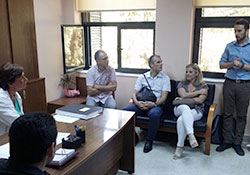The voices of Greek patients to be heard by a more responsive health system

WHO
The Greek Ministry of Health has committed to paying more attention to patients’ experience during the ongoing health reform. It aims to establish a continuous feedback mechanism to assess the quality of services provided and measure the impact of reform initiatives.
To help achieve this, a team of international and local experts in health services research, under the coordination of the WHO Project Office in Athens, initiated the development of a patient experience/user satisfaction survey tool. They also began developing guidelines for health managers conducting this type of survey in the future.
The team visited Greece on 3–4 June 2017 to participate in meetings with stakeholders at different levels, including users and providers of health services. They presented policies and tools recognized as good practices in other European countries, and discussed key issues related to developing and piloting the survey tools.
The team will share the final versions of the survey questionnaires with relevant partners, including professionals’ and patients’ associations, for further discussion.
In the pilot phase, the customized questionnaires will assess the experiences and preferences of Greek people related to primary care, ambulatory specialist services and hospital services. The survey will generate information primarily for health managers and service providers. It has the potential to be implemented on a larger scale in the Greek health care system.
The country visit was carried out under the “Strengthening capacity for universal coverage” (SCUC2) initiative.
Background
The SCUC action is carried out with funding by the European Union through a grant agreement between the European Commission and WHO/Europe. The general objective of the action is to contribute to improving health and health equity in Greece, especially among the most vulnerable in the crisis-stricken population, by helping the Greek authorities move towards universal coverage and strengthen the effectiveness, efficiency and resilience of their health system.



